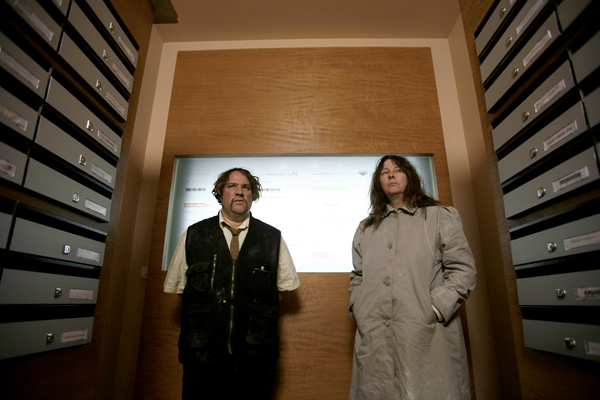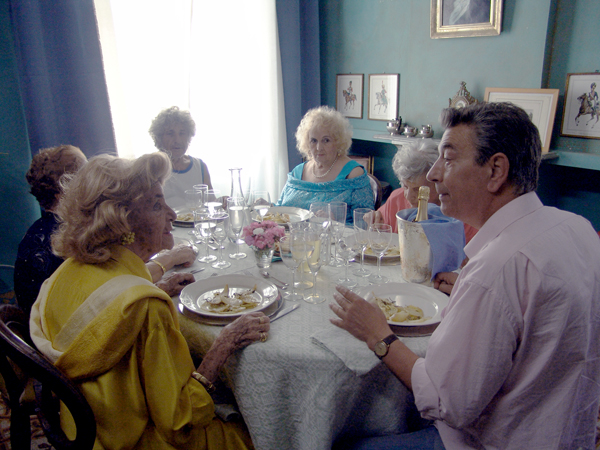|
Reviews of Recent Independent, Foreign, & Documentary Films in Theaters and DVD/Home Video

NEW DIRECTORS/NEW FILM 2009—PART TWO SPLAT. That’s the sound of body parts hitting the ground, or one of this pitch-black comedy’s gags falling flat. More often than not, though, the blazingly rude French/Belgium co-production Louise-Michel succeeds. Directors Benoît Delépine and Gustave Kervern relentlessly set-up at least one joke a minute, most which work—whether they offend is another matter. Out in the boonies, a textile factory shuts down—the management has skipped town overnight. At the local bar, the assembly-line workers, all women, debate how they can pool their severance pay toward a useful endeavor. After a few rejected ideas, the suggestion by the antisocial and taciturn Louise unanimously wins: hire a professional to wack the factory boss. Louise (Yolande Moreau) is a little, ah, touched, speaking the patois of Tarzan: “Me don’t like newspapers.” She finds her hit man when she notices a gun dropping out of the jacket of slovenly trailer park security guard Michel (Bouli Lanners) in broad daylight. Perhaps because of their against-all-odds ineptitude you want Louise and Michel to succeed, at least in something. But the film benefits in no small measure from the current recession and public resentment toward corporation largess. It’s easy to sympathy with Louise, who makes home-cooked pigeon, while a corporate fat cat secludes himself in a luxury villa. As mentioned earlier, there are a few misfires: a kooky trailer park resident reenacts 9/11 with miniature planes crashing into homemade replicas of the World Trade Center. Here, the directors try too hard to provoke. However, in its funniest moments, the film displays the delicate timing of the best silent comedies. Strangely, though the plot is cynical, the film is not. In its own way, it’s a romantic comedy, though I’m stretching that term. To get the full picture, stay for all of the final credits. With Louise-Michel, the 39th edition of New Directors/New Films offers a launching pad for introducing new and up-and-coming filmmakers to an American audience. Louise-Michel and the following three films couldn’t be more disparate, but they’re each noteworthy in their own way—a healthy indicator of this year’s solid line-up after two previous spotty outings.
His opinionated guests are as petulant and demanding as teenagers, only with life experience. Gianni makes sure they have their medication, and, for himself, a glass of Chablis within reach. This playful kitchen sink comedy is the last sort of film one would expect from gritty director Matteo Garrone, the film’s producer. (Lead actor and director Gianni de Gregorio, who also wrote the screenplay, co-wrote Garrone’s Gomorrah.) Incredibly, none of the women have acted before. Now, a 10-year ego trip in the making. Meet We Live in Public’s Luvvy, the scary looking alter ego of nerdy prodigy Josh Harris. Why did Harris dress in drag as a clownish variation of Gillian’s Island’s daffy Mrs. Howell to meet potential Wall Street investors? Because he could. When you have 80 million dollars at your disposal, you can be forgiven anything. And with his money, he threw lavish parties. Think Jay Gatsby, not in love with Daisy but with himself. Documentary filmmaker Ondi Timoner first worked with Harris in late 1999 as a camerawoman on the set of a bizarre, fascist communal experience called Quiet: We Live in Public, where over 100 volunteers donned uniforms and slept in bunkers surrounded by cameras and monitors for 30 days. Nothing was private, even in the bathroom. For activities, there was an interrogation room and a shooting range in the basement. One of Harris’s main talents is to direct all of his ideas toward himself, including an interactive Web site, Weliveinpublic.com, where his domestic life with his girlfriend was open to prying eyes. (Tellingly, once she finally dumps him, viewing plummets.) The film has a train-wreck fascination about it. However, the director is less convincing in her belief that Harris was a forerunner to virtual communities like Facebook, where aspects of everyone’s lives are out in the open. Harris could care less about others. This man is an island. Ultimately, all of his projects were about himself.
In a
departure from many low-budget slacker comedies, the acting saves
director Bob Byington’s film from aimless self-consciousness, making you
wonder what next will be said out of left field. Though well done but
far from groundbreaking, this movie doesn’t really have anything new to
say. It’s odd that this slice of write-what-you-know was sponsored by
the Sundance Film Institute. Kent Turner New Directors/New Film 2009—Part One
|



